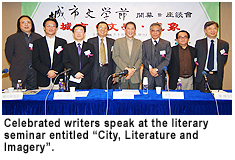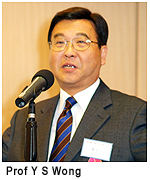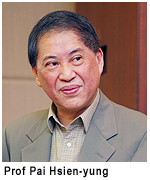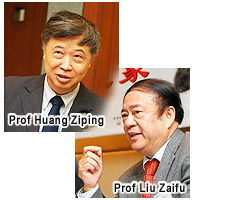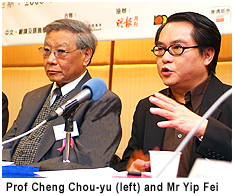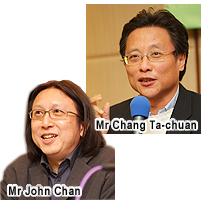City Literary Festival: From Campus to City
Karen Lai
Eight celebrated writers got the Hong Kong-Macao City Literary Festival underway at City University of Hong Kong (CityU) this week with an enthralling discussion on the experience of writing, the breadth and depth of Chinese literature, and creative writing tips for younger writers.
The Festival reinforces the University’s strong commitment to promoting literature and grooming young talent in Chinese literary writing in the community and beyond.
The eight writers include Professor Pai Hsien-yung, who has lectured at CityU on several occasions; Professor Liu Zaifu, an Honorary Professor in the Chinese Civilisation Centre (CCIV) at CityU; Mr John Chan, founder of City Magazine; Mr Dong Qiao, a writer and Publisher of Apple Daily; Mr Chang Ta-chuan, a Taiwan-based novelist; Mr Yip Fei, a poet and Deputy Editor-in-chief of Ming Pao; and the scholars Professor Cheng Chou-yu and Professor Huang Ziping.
At the opening seminar, entitled “City, Literature and Imagery”, Professor Y S Wong, Vice-President (Administration), stressed the importance of literature in today’s society.
“CityU emphasizes science and technology, but we also believe in the importance of the humanities, and we are committed to fostering students’ creative interests in the pursuit of whole-person development,” said Professor Wong, making specific reference to an article by Mr Dong called Lighting the Backyard in which the author explores how technology today is seen to sideline literature and the humanities.
“We want the Festival to provide a platform for young people in Hong Kong and Macao to develop their interest in Chinese literary writing, thereby enhancing their appreciation of the arts and humanities,” Professor Wong added.
At the seminar, which took place on 25 February and was hosted by Professor Cheng Pai-kei, Director of CityU’s Chinese Civilisation Centre and Professor Wu Hung I, Professor (Chair) of the Department of Chinese, Translation and Linguistics, the invited writers discussed how the concept of “City” inspires creative writing and helps us understand our surroundings.
Professor Pai, the author of the novel Taipei People, has lived in some of the world’s major cities—Chongqing, Los Angeles, Hong Kong, Santa Barbara, Nanjing, Beijing, Shanghai and his birthplace Guilin—and he tries to infuse his fiction with the colour and vibrancy found where he lives. Writers, he said, were captivated by “City”, and Taipei and New York were two very important ‘characters’ in his work.
Turning to non-fiction, Professor Huang, from Hong Kong Baptist University, said writing prose was easy to begin with, but hard to write well. Prose as a literary genre had been fading in Hong Kong, he said, but he encouraged young writers to use it as a means of expressing feelings
about the complicated and beguiling city they live in.
Professor Liu said writers should develop a strong faith in all kinds of literature and that to judge a good piece of prose he looked for faithful self-expression; self-consciousness and truth; and effective language skills.
Regarding verse, Mr Yip, Deputy Editor-in-chief of Ming Pao and a published poet, said poetry groups were very popular in Hong Kong during the 1970s and a whole generation of young people had composed poems. Their language proficiency had benefited them later in life, he said, and he urged young people to develop a sense of curiosity about their city.
Another poet, Professor Cheng, said poetry originated from a sensitivity towards nature and humanity, and the most important aspect of a poem was genuine self-expression. Inspiration was everywhere, he said, and he advised young people to note down interesting encounters or captivating landscapes.
The Taiwanese novelist, Mr Chang, discussed his upbringing and his journey towards writing novels, suggesting that without exposure to real life or a strong sense of inner motivation, people cannot write well.
Author and media critic Mr Chan said he was influenced by many renowned writers in Taiwan when he was at university and that after studying journalism in the US his writing
began to absorb western writing as well. “The world of literature is no mystery,” he said. “When you walk through its main door, you will find there are many side-doors, each of which will usher you to a specific area of literary appreciation. It’s up to you to decide how many doors you will open.”
Sharing sessions hosted by CityU’s Professor Zhang Longxi, Dr Ma Ka-fai and Mr Dong Jiuxiong were held on the same afternoon with Mr Dong, Mr Chang, Mr Chan, Mr Yip, and Professor Cheng covering prose, short stories and poetry.
Meanwhile, adjudicators have started reading through submissions for the City Literary Award, one of the major highlights of this year’s Festival.
“The Award provides an incentive for young people and we hope the competition can sharpen younger writers’ language skills,” Professor Cheng said. “We are also very glad to have long-term collaboration with the Hong Kong Arts Development Council in co-organizing the Festival, and we are planning to develop it as an annual event.”
The results will be announced at the end of March and an anthology of winning entries is planned for publication in August.
The co-organizers and sponsors of the City Literary Festival also include Ming Pao Monthly, Ming Pao Publications Ltd, Radio Television Hong Kong (Putonghua channel) and the Macao Foundation.
